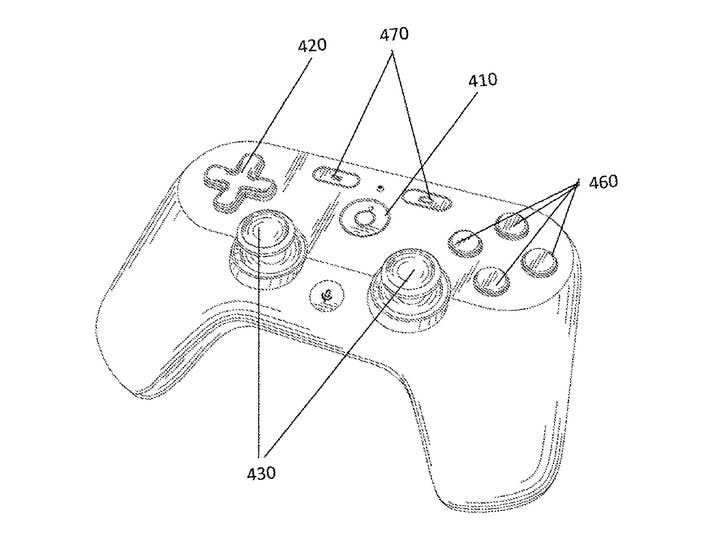Google patent application describes notification system for multi-device controller
Filing unearthed ahead of big GDC reveal next week
Two patent applications have come to light that may hint at what Google has planned for this year's Game Developers Conference.
As with all patent applications, there are no guarantees of the described devices and systems ever coming to market, but with Google teasing a big reveal at GDC 2019 -- rumoured to be a new console and/or streaming device -- the details in both documents are worth looking through.
The first application -- published January 31, 2019 -- describes a new game controller, or rather a system for notifications on a game controller. The company proposes a gamepad that "provides notifications for a game invitation, a chat message, an indication that a user's high score has been beaten, or the like."
While the filing mentions a display, it also indicates these notifications could be indicated through the changing colour of LED lights around the buttons and a mixture of chimes.
The controller would also allow players to react to these notifications, hitting a button to power up the host device, launch the game application and log in to the user's account. This would be accomplished through readable memory built into the controller that would store one or more user's preferences and account information.
Interestingly, the application also indicates the controller will work with "one or more host devices (e.g. a television monitor, a tablet, a smartphone, etc)" -- indicating Google may be gearing up to launching a cross-platform games service, rather than a dedicated console.
Under another paragraph suggesting that there may be multiple host devices for the controller, there is mention of games stored on DVDs. Either Google also has a console in the works, or it's planning to launch a service on current platforms such as Xbox One and PlayStation 4.
The patent application also indicates the controller may be used to switch devices -- for example, if the same game is installed on both a smartphone and a tablet connected to a TV. It reads: "If the smartphone is the default host device and the user selects the table from the game controller, the tablet may be activated, the game launched thereon, and displayed on the television."
A second application -- published February 28, 2019 -- describes a system for "independent control of interactive streaming media". While it appears to be more general, referring to any streamed video content, mention of "a streaming session in a cloud-based gaming environment" lends further weight to rumours of Google launching a new games streaming offering based on its earlier experiment with Ubisoft.
PCGamesInsider notes that both filings refer to situations where Google's systems and devices may collect and make use of personal information, although says users may be able to control what information is collected.
"In addition, certain data may be treated in one or more ways before it is stored or used, so that personally identifiable information is removed," both documents read. "For example, a user's identity may be treated so that no personally identifiable information can be determined for the user, or a user's geographic location may be generalized where location information is obtained (such as to a city, ZIP code, or state level), so that a particular location of a user cannot be determined. Thus, the user may have control over how information is collected about the user and used by a content server."
Google's keynote at GDC is currently scheduled for Tuesday, where hopefully we'll learn more about what ventures these patent applications are associated with.
NOTE: A previous version of this article referred to these filings as patents, rather than patent applications. This has been amended.

